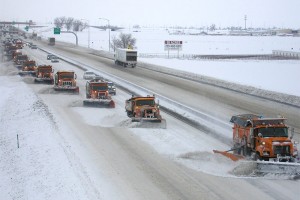Keeping it clean – Tractor trailer rigs on the road
At issue are the liquid de-icers that have become a common treatment in the DOT’s battle with ice and snow. Magnesium chloride and calcium chloride are sprayed on pavement in advance of a coming storm, and these chemicals can prevent ice from forming on the roadways, making the roads safer for travel and snow removal…

At issue are the liquid de-icers that have become a common treatment in the DOT’s battle with ice and snow. Magnesium chloride and calcium chloride are sprayed on pavement in advance of a coming storm, and these chemicals can prevent ice from forming on the roadways, making the roads safer for travel and snow removal easier.
Some of the properties that make these chemicals effective in keeping roads clear are the same characteristics that make them so destructive.
It has been noted that magnesium chloride and calcium chloride are highly water-soluble, so they produce a finer mist of spray under the vehicle than traditional rock salt.
Both these chemicals tend to absorb moisture from any source, which means that even when the weather and your equipment are dry, these chemicals continue to attract moisture. They easily mix with the water that they attract and seep into the tiniest cracks.
Frame rails, cross-members, suspension components, air tanks, fuel tanks, battery boxes, brackets, brake shoes, electrical systems, air conditioning condensers, radiators, metal coolant tubing, steel wheels, cab floors and refrigeration units are not safe. “Rust-jacking” a term used to describe when corrosion develops between the brake shoe table and the brake lining. On a rust-jacked brake shoe, rivets will still be holding part of the lining to the shoe, but in between the rivets, it’s cracked. Corrosion can seep into air brake systems, as well. This issue is not just a trucking industry concern. Some studies show that these chemicals cause concrete to deteriorate more rapidly, and electrical utilities have reported corrosion of power poles as well as electrical shorts.
For several years, MTAC has been at the forefront of the discussion about the vehicular corrosion caused by caustic road treatments. While we concede that the new materials do a good job at keeping our highways safe before, during and after winter weather events, we have brought attention to the damage caused by these chemicals.
What you can do
Research and selecting parts:
- Look for components with corrosion resistant coatings.
- Opt for premium brake shoes when ordering trailers.
- Spec & retain brake dust shield.
- Consider stainless steel parts when affordable.
- Specify premium-wiring systems, sealed wiring connectors.
- Specify full fenders – and fender liners when available.
- Minimize specs combining dissimilar metals, which can cause corrosion when they touch even without the aid of de-icers. Separate such components with insulation.
Maintenance:
- Wash trucks frequently and thoroughly, especially the underside of the chassis and where dirt and water collect.
- Hose out radiator/AC condenser regularly when de-icing chemicals are in use.
- Wax polished aluminum and stainless steel accessories.
- Keep mud flaps in good repair to minimize salt spray.
- Inspect brake shoes and linings regularly. Remove brake drums so the entire lining surface and the brake shoe web, rollers and cam can be inspected.
- Specify rust proof painted or epoxy-coated brake shoes when rebuilding.
- Repair chassis paint stone chips ASAP, don’t drill unnecessary holes, and paint edges where you do drill.
- If parts need repainting, have them repainted and recoated by a professional with corrosion-resistant products.
- Do not probe through the insulation to test wiring because it can open an avenue for chemical corrosion.
- Clean out electrical connectors regularly with water (not soap) and a wire brush, and grease with dielectric grease. Don’t forget the seven-pin connector where it is plugged into the tractor.
- Protect battery posts and terminals with anti-corrosive spray.
Currently in Connecticut, a study is underway to determine the efficacy of these substances, the damage that they do, the costs and benefits and whether effective alternatives are available. In the meantime, we are vigilant in our research efforts, so that we may make recommendations that help our members deal with the issue of corrosion. Understand that the washing of vehicles, where wastewater flows into watersheds, can violate certain “storm-water runoff” regulations and should be done in accordance with the law.
